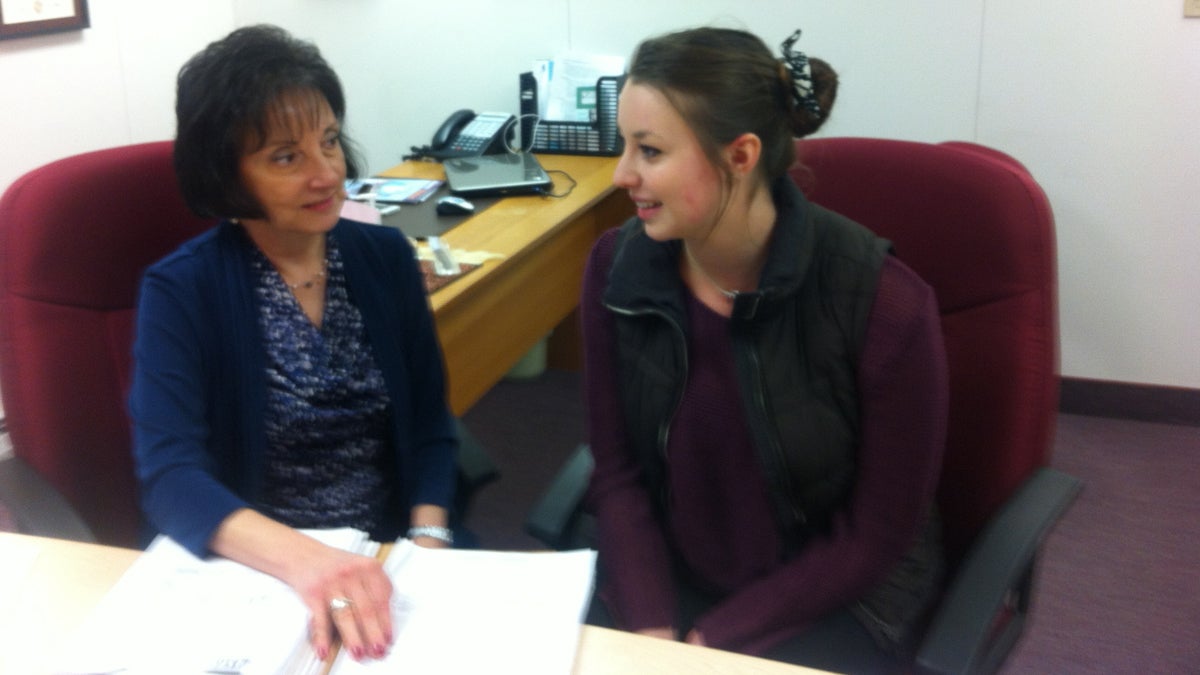Ensuring a full recovery: The right care in the wake of a concussion
Listen
Rosemarie Scolaro Moser reviews cognitive testing with former concussion patient Andrea Cooper (Maiken Scott/for The Pulse)
N.J. doctor says complete rest for a week or more is the best policy, even if active teens get angry about it.
The impact of sports concussions was one of the biggest health news stories of 2013, both with professional and youth athletes.
Read Elana Gordon’s story on why helmets are no magic bullet for preventing concussions.
Last fall, the NFL settled for $765 million in a class action lawsuit by former players over concussions. The case was heard in Philadelphia. And more recently, a Mississippi father filed a federal class action suit on behalf of all student athletes asking colleges and high schools to provide better information on concussion risks.
And, it’s not just football, of course. Many of the sports Americans love; hockey, soccer, cheerleading– risk jolts to the head that can lead to concussions – that’s when the brain rocks inside the skull.
What researchers have learned about the serious and long-term consequences of concussions has spawned heated discussions about the risks of playing sports. Is it worth it? When to sit out, when to return?
“I’m pro-sports,” states Dr. Rosemarie Scolaro Moser who leads the Sports Concussion Center of New Jersey in Lawrenceville. She says, as long as young athletes receive the right treatment and right care, right away, most concussions will heal, without long-term consequences. She adds that researchers have learned a lot about what makes a full recovery possible after a concussion. She says one major issue is to avoid sustaining several concussions in a row.
Too many blows, back too soon
Andrea Cooper’s medical file is a thick tome. She reviewed her records during a recent visit to Moser’s clinic, and went over cognitive test results. Cooper is 18 years old, and a high school senior. She got her first concussion playing football at a party. She had a splitting headache, and was getting sick to her stomach, so she went to the emergency room.
Doctors told her to rest, and go back to what she was doing. She did. She got her next concussion cheerleading.
“A girl fell on my head, from out of the air, and my mom was getting a little bit like, ‘You have had two concussions, if you get another one, you are done cheering,’ And I was not happy about that at all.”
It did happen again. Andrea slammed her head on a wood floor during a cheerleading competition. Even though she knew she was in bad shape, she got right back up: “So the entire time I’m competing, I’m like, ‘Please please, don’t make me have to throw up in my uniform.'”
Andrea Cooper started to act differently.
“Andrea, I don’t know if you remember, but when you first came, there were a lot of mood issues,” said Rosemarie Moser.
“I was definitely really irritable,” admitted Cooper.
Soon, she started to have trouble concentrating, and doing her school work: “Every single thing the teachers said, it was in one ear and out the other, no matter how hard I tried, I couldn’t get my grades up.”
She said at the same time, her parents thought she wasn’t trying hard enough. Her mother, Luise Cooper, was told Andrea needed to rest, but until she started treatment with Dr. Moser, she didn’t understand what rest really meant.
“We were having difficulty understanding she needs to rest her brain, you need to take her out of activities, you need to stop.” Andrea’s mother said. “She can’t go to gym; she can’t be in cheerleading. We really fought it, because she didn’t want it, and we didn’t understand it.”
Since Cooper had several concussions in a short period of time, she is now really at risk for future concussions. For example, she got one just bumping her head in the shower. She is not allowed to play any sports, and has to be extra careful no matter where she is, or what she does. She has had several periods of absolute rest, and her cognition and concentration have since improved.
Facilitating a full recovery
Neuropsychologist Rosemarie Scolaro Moser is trying to spread awareness about treatment after concussions. We asked her a few questions about the right care:
What are the first things you should do?
First of all, if you suspect a young athlete or a youngster has sustained a concussion, seek medical attention. Make sure the person is evaluated by a medical professional. Once the diagnosis has been made, then the next step is immediate rest.
What we mean by that is to rest the brain. If you injured your arm, you’d put it in a cast so that you can’t use it. You can’t do that to your brain, but you can reduce the work load.
Don’t go to school
Don’t go to work
Don’t use video games, computers, or smart phones; don’t text, or email
Don’t watch TV
Also, we like to keep young people away from activities where they can sustain another hit. If you have not fully recovered you are more likely to sustain a second concussion.
How long should you rest?
What we recommend here, at the center, is one week of comprehensive rest. Some people need less, some need more, but we start out with one week. After that, we re-examine the person, then we give them a program for back to school, and finally, back to athletics.
Does rest work even if the concussion was a while ago?
Yes, if you are still symptomatic, we find here in our clinic, that yes, you can still have significant improvement. We have done one study on this, and are about to publish another.
Teens must absolutely hate a prescription of total rest. How do you handle that?
Yes, they are very angry at me, and I have had teens stomp out of my office. But if they try it, they come back a week later and tell me that they feel so much better.
Some people might say to you that generations of kids have played sports, without any of this knowledge about concussions, and they turned out fine.
Yes, I hear that. Now we know more, kids play harder, more seriously, they do more risky things, they play year-round starting at an early age. Their exposure is much greater than in the past, they could be getting subconcussive blows on the soccer field, so by the time they are ten, and they get a big concussion, it is a serious problem.
How do I know if my physician is up-to-date on the latest concussion info and research?
Ask them if they have had training and experience in sports concussion.
Ask them if they are familiar with the “Zurich international guidelines” on concussion.
If they grade the concussion, that’s out of date, we don’t grade concussions anymore, we don’t know how severe they are until you have healed.
If they tell you to just rest without examining you, that’s not good.
WHYY is your source for fact-based, in-depth journalism and information. As a nonprofit organization, we rely on financial support from readers like you. Please give today.




